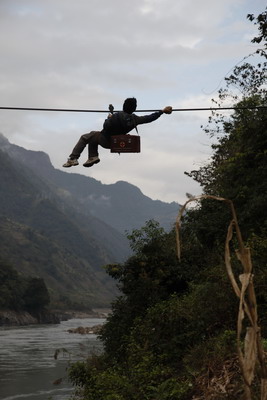Rural doctors to get more perks
Health authorities have urged the inclusion of more village doctors in the social welfare system to improve their livelihoods.
 |
|
Li Jiasheng crosses the Nujiang River by sliding on a 400-meter-long zip line. |
Unlike their urban counterparts, village doctors are not paid with public funding, and receive neither pensions nor social insurance.
"Village doctors are classified as members of the rural population and hence excluded from the social welfare system," Ministry of Health department of rural health management official Yao Jianhong said.
"They also are not qualified to work for public hospitals. Their living conditions are pretty tough."
Minister of Health Chen Zhu suggested local authorities provide them with more financial assistance in a speech at the ministry's working conference on Thursday.
He also vowed to ensure adequate numbers of medical workers and affordable care at grassroots medical institutions.
There are now about 1 million village doctors in the country. They care for 900 million rural residents for whom it is too inconvenient to spend hours walking to town to visit licensed caregivers.
Fang Huahui is the only doctor for the 4,000 residents of Tongning village, on the outskirts of Guangxi Zhuang autonomous region's capital Nanning.
The 49-year-old received more than 20,000 patients, or an average of seven a day, between 2003 and 2010.
"I worry meager incomes may push village doctors into the corner," Fang said.
Although the autonomous region's government provides 300 yuan ($45) a month to each village doctor, the money is not enough for them to make ends meet.
Fang's only income source is the medical service charge paid by patients, who are sometimes too poor to afford the costs. He foregoes at least 3,000 yuan in charges a year to save lives.
Zhang Hua, a village doctor from Jiangxi province, gave similar accounts in Beijing on Thursday.
"Many doctors from nearby villages wrote letters to me when they heard I was going to Beijing, asking me to report their pension problems to high authorities," he said.
Although Jiangxi's village doctors receive a 1,580-yuan annual subsidy, most elderly doctors cannot retire for fear of income loss.
Fu Zhensheng, a village doctor in Fengtai, a suburban district of Beijing, pointed out other obstacles to retirement.
"An 800-yuan subsidy and poor prospects cannot attract young people to (become apprentices) in my clinic, so I'm having a lot of trouble finding a successor," the 56-year-old said.
Currently, 30 provinces provide village doctors with allowances, and 16 of them raised the minimums last year.
The government will increase rural doctors' subsidies in the next five years and include more rural doctors in the social welfare system, Yao, from the ministry, said.
"After all, they play a crucial role in the country's extensive rural areas, where no (urban) medical experts will go," he said.
 0
0 






